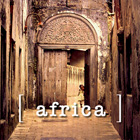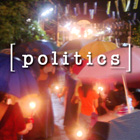
|
|||||||
Photo credit for "Africa" graphic, above: © 2005 Jennifer Lewis
|
OBSERVERS WARN UGANDA ELECTION PROCESS NOT FAIR
MUSEVENI TO STAND FOR RE-ELECTION AFTER 20 YEARS IN POWER, SEEN AS OBSTRUCTING OPPOSITION CAMPAIGNS TO ENSURE VICTORY 21 February 2006 Uganda is a complex political fabric in a volatile regional patchwork. The nation has been ruled for 20 years by one man at the head of one party (NRM), and now President Yoweri Museveni will face his first multi-party election contest. Recent weeks have seen arrests, allegations of intimidation and use of single-party government structures to impede opposition campaigns. Human Rights Watch has sought to address the problem in an open letter to world press, governments and election monitors. The letter details the government's use of official mechanisms of influence to spread its message and to downplay the strengths or ideas of opposition parties. HRW reminds observers "Uganda’s elections on February 23 are multi-party contests in a single-party state", and therefore allegations of abuses must be taken very seriously and dealt with in advance of the voting. the organization also reports having "documented fifty-eight cases of intimidation or violence by state security agents or NRM activists against members or supporters of the opposition". There are also reports of individuals from the lead opposition party, the Forum for Democratic Change (FDC) threatening or using violence against individuals who are members or supporters of the NRM. The letter specifies "As of February 1, the police were investigating cases of intimidation and violence by the NRM in twenty-two districts and by the opposition in six". Added problems arise from the lack of adequate security to protect against violence and intimidation at the polling stations. In the absence of general security and in a volatile political climate, security will be assigned to government funded armed militia, some of which are headed by members of the ruling party, who are also seeking re-election in the polls their armed factions will guard. There are also fears of abuses by armed rebels in the north, where a "messianic" leader seeks to establish a form of theocracy. The factional leader, accused of violence, coercion and enslavement of civilians, was reportedly the target of the first warrants issued by the International Criminal Court. The Museveni government has been engaged in a negotiation process, but no peace is yet in place. Regional inter-ethnic and factional conflict, in neighboring Rwanda and DR Congo has taken millions of lives, and there are fears the conflict in northern Uganda could promote increased political violence, even if it does not constitute full-scale civil war or ethnic cleansing as such. This array of obstacles presents itself to the election process, clearly undermining efforts to hold a peaceful, free and democratic election process. Museveni's National Resistance Movement has long held that factional violence born of multiparty politics has been responsible for Uganda's slow development and human rights abuses. This was the main philosophical basis for Museveni's blocking political activities by parties other than the NRM. Though the contested 2001 election was ruled 3-2 by the Supreme Court to have been marred by widespread fraud and intimidation, the court also found 3-2 that the abuses were not sufficient to alter the overall results and upheld Museveni's re-election under the one-party Movement system. [s]
CONGOLESE CHILD SOLDIERS DISARMED The UN reports that over 400 child soldiers were "demobilized" in the Eastern Congo, a region still plagued by instability and deprivation. The child rebels were offered humanitarian and food aid in exchange for their weapons, setting what might be an example for other such missions in war-torn, remote regions. [Full Story] |
||||||
|
|||||||

